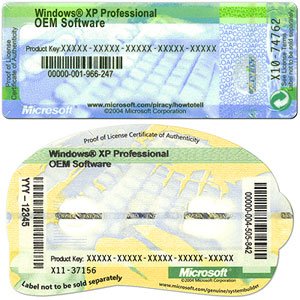 If you buy a non-branded PC built by a local neighbourhood PC shop, then you need to check at time of purchase that you have both the software discs and the COA, or you could find yourself in trouble at a later date.
If you buy a non-branded PC built by a local neighbourhood PC shop, then you need to check at time of purchase that you have both the software discs and the COA, or you could find yourself in trouble at a later date.This was brought home today when a customer brought in a no-brand machine that was purchased in 2004 from a local neighbourhood PC shop. The first thing I found surprising was that the PC was running Windows 2000 Professional, an operating system aimed squarely at the business community and not the home user. As Windows XP, the first choice operating system for home users, had been around since 2001, it seemed strange that our customer's machine had been loaded with 2000 Professional. I'm sure it had nothing to do with the fact that 2000 Professional does not require product activation and can, therefore, be installed on multiple PCs - a tempting financial proposition for a less than scrupulous dealer! The absence of a Microsoft COA on the system box and the fact that the customer was not supplied with any OS installation discs was possibly just an oversight on the shop's part, or maybe not. As it happens, the customer also purchased Microsoft Office with the PC and again, no COA or product key was supplied nor any installation discs.
So what happens when such a customers PC requires a full reinstall due to either a hard disc failure or operating system corruption. Well, they need to buy a new operating system licence and a new copy of Microsoft Office as without the product keys supplied with the COAs for these products they cannot be reinstalled. And this could be quite an expensive proposition - several hundred euros when you include Microsoft Office.
So, if you are offered a PC for sale, make sure that there is Microsoft COA stuck on the system box, it is a requirement of Microsoft's licence agreement that this be done. Also, you should be supplied with original Microsoft discs for all Microsoft software that is supplied with your PC. If they refuse to supply you with COAs or discs, then take your custom elsewhere.
If you have already bought a PC and you did not get a COA or original discs, e.g. for Microsoft Office, then you should return to the vendor and point out that you are entitled by law to these and ask that they be supplied. If the vendor refuses to supply them to you then you should bring your complaint to Microsoft as the vendor is in breach of Microsoft's licence agreement. More information on the COA and what to do if you don't receive one can be found here on the Microsoft website.